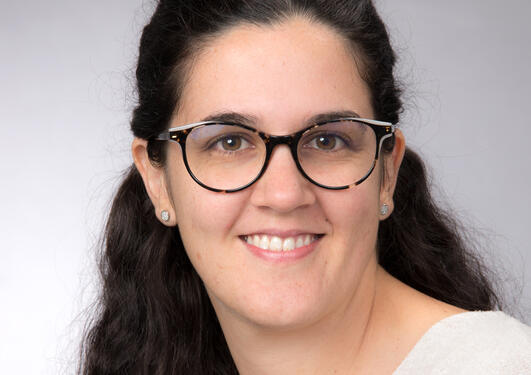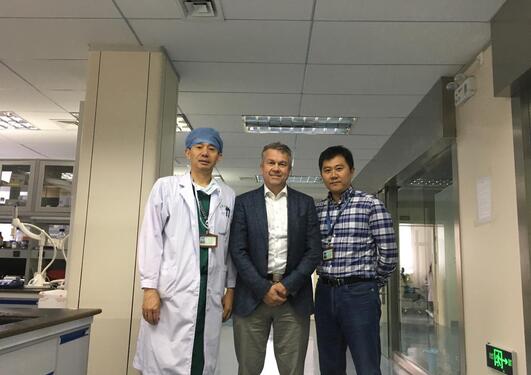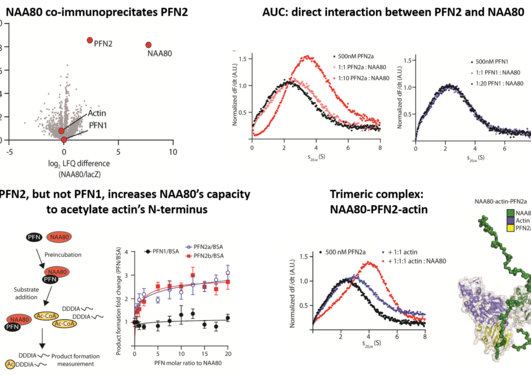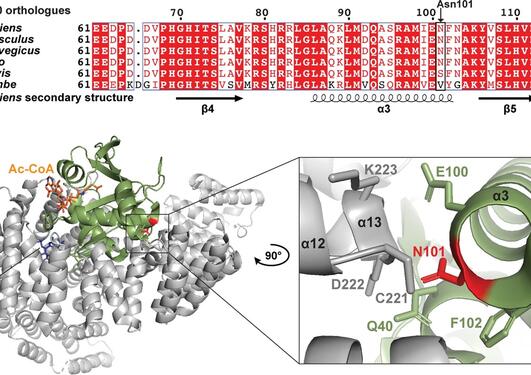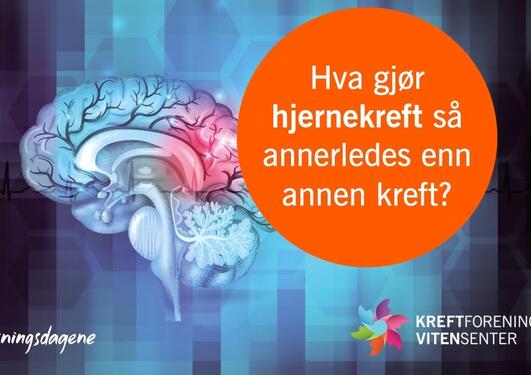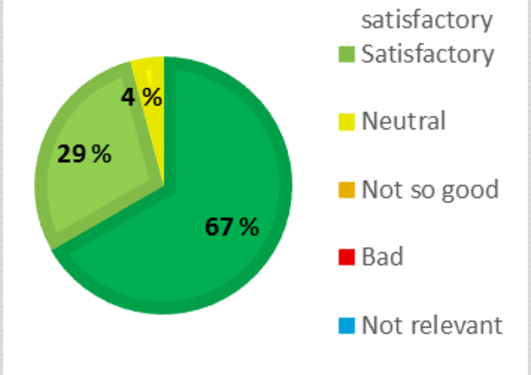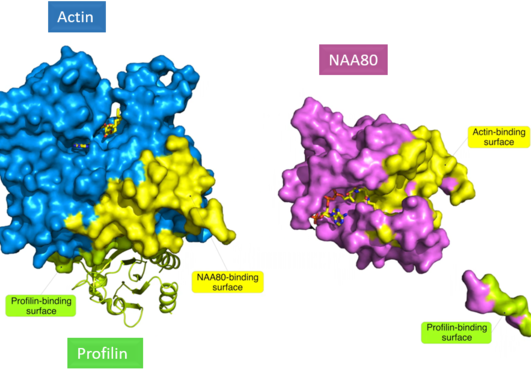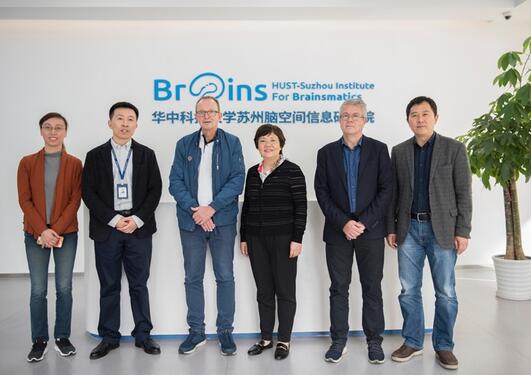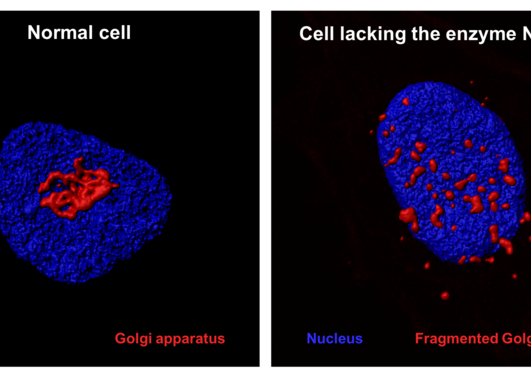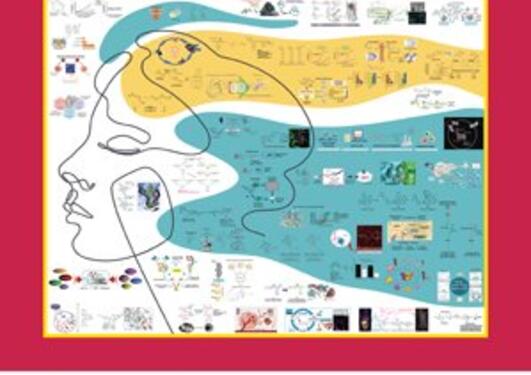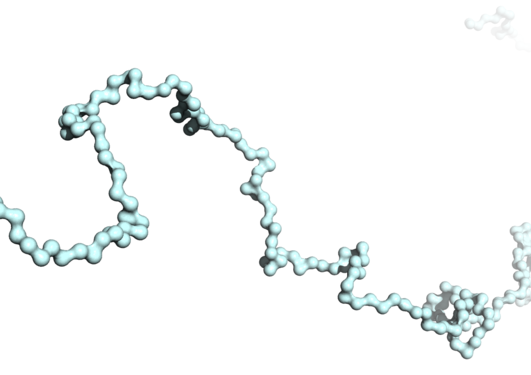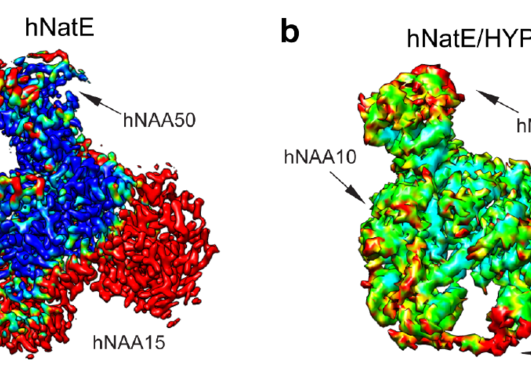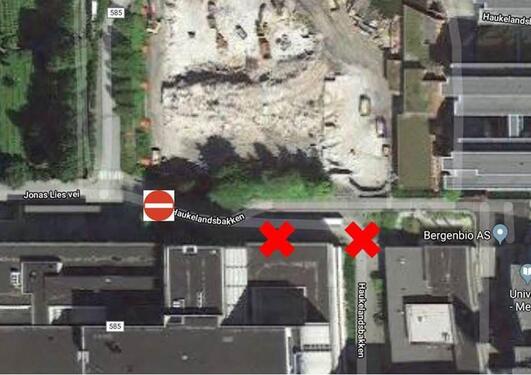News archive for The Department of Biomedicine
Best PhD prize 2019 – Andrea Gras Navarro - “Towards Natural Killer cellular Immunotherapy for glioblastoma. KIR-HLA ligand interaction and proteasome inhibitors to potentiate efficacy"
Professor Frits Thorsen and his research group at the ChiNor Research Laboratory has newly received a significant funding of 550 000 RMB over four years (equivalent to 200 000 NOK per year), from the China´s National Natural Science Foundation, for their ongoing research on exosome-derived miRNAs in brain metastases.
Actin is modified by N-terminal acetylation which regulates its role in steering cellular architecture and cell motility. Now the machinery performing this acetylation is uncovered.
Several variants of the NAA10 gene have been found in patients suffering from developmental delay and hemihypertrophy. NAA10 steers the most common protein modification in humans: N-terminal acetylation.
Rolf Bjerkvig of the group for translational cancer research has given a lecture at the Norwegian science festival "Forskningsdagene" in 2020. You can watch a video at the Norwegian Cancer Union.
Few people know the researchers Agnar Nygaard and Kjell Kleppe, but in the 1960s they were part of the world elite that laid the foundation for today's COVID-19 tests. Two permanent exhibitions about the pioneers have now been opened.
On Thursday 12th of March, the University of Bergen was shut down on short notice. Employees and students left their study and workplaces, worried about the recently declared pandemic situation and how the next weeks and months would be like.
BiSS is growing as a core facility, and we are quite happy that our users are satisfied.
UiB spin-off biotech company BergenBio announced that their drug bemcentinib is frast-tracked in a phase-II clinical trial as a potential treatment against COVID-19.
Have you ever considered doing a research stay abroad to broaden your scientific horizon? Postdoctor Sylvia Varland recently returned from a 2-year research stay at University of Toronto. Learn more about her scientific adventure and cultural experiences.
Actin is the most abundant protein in human cells and is involved in numerous functions including steering cellular architecture, cell motility and cell division. Recently, UiB researchers identified NAA80 as a long-sought actin regulator. Now, the structure of NAA80 bound to actin and profilin reveals its mechanism of action.
Exosomes released from the primary tumour into circulation have been documented to promote pre-metastatic niche formation. We have identified a miRNA in exosomes from melanoma brain metastases that can play a vital role in this process. Knock-down (KD) of this miRNA results in an inhibition of brain metastatic growth. We are in the process of identifying potential drugs inhibiting the expression... Read more
Research leaders at the Translational Cancer Research group have newly established a research collaboration with the HUST-Suzhou Institute for Brainsmatics, to study the development of brain tumors and brain metastasis.
During his Erasmus internship in the Arnesen lab, Tobias B. Beigl took great interest in his project on the recently identified NAA80 enzyme. Beigl was on an interesting and important research track and stayed on for a Master’s project trying to figure out why cells lacking NAA80 typically had a more fragmented Golgi apparatus. He recently published his findings in the scientific journal... Read more
Myelin, the insulative multilamellar sheath that enwraps axons, speeds up our nerve impulses by two orders of magnitude – a prerequisite for an efficient nervous system that we humans and other vertebrates enjoy. Myelin gains its structure and function from a high abundance of lipids and proteins, many of which are specific to this enigmatic biological system.
In human cells, N-terminal acetylation is among the most common protein modifications. Now, researchers at the University of Pennsylvania and the University of Bergen have revealed the structural and biochemical properties of the major molecular machine involved in this process. Cancer cells require this enzyme for survival and proliferation.
From 2 January, the ramp north of Haukeland University Hospital will be closed for cars, bikes and pedestrians for the whole year 2020.
Pages
- September 2024 (1)
- August 2024 (2)
- June 2024 (3)
- May 2024 (1)
- April 2024 (1)
- March 2024 (1)
- February 2024 (3)
- January 2024 (1)
- October 2023 (2)
- September 2023 (2)
- August 2023 (2)
- July 2023 (2)
- March 2023 (4)
- February 2023 (1)
- December 2022 (4)
- November 2022 (1)
- October 2022 (4)
- September 2022 (3)
- June 2022 (2)
- May 2022 (4)
- April 2022 (3)
- March 2022 (8)
- January 2022 (2)
- December 2021 (1)
- November 2021 (3)
- October 2021 (1)
- September 2021 (3)
- August 2021 (4)
- July 2021 (1)
- June 2021 (2)
- May 2021 (1)
- April 2021 (2)
- March 2021 (2)
- February 2021 (4)
- January 2021 (1)
- December 2020 (4)
- November 2020 (4)
- October 2020 (2)
- September 2020 (5)
- June 2020 (1)
- May 2020 (2)
- April 2020 (3)
- March 2020 (2)
- February 2020 (4)
- January 2020 (1)
- December 2019 (3)
- November 2019 (6)
- October 2019 (2)
- September 2019 (4)
- August 2019 (2)
- June 2019 (4)
- May 2019 (4)
- April 2019 (1)
- March 2019 (7)
- February 2019 (8)
- January 2019 (7)
- December 2018 (3)
- November 2018 (5)
- October 2018 (4)
- September 2018 (5)
- August 2018 (4)
- July 2018 (2)
- June 2018 (2)
- April 2018 (2)
- March 2018 (4)
- February 2018 (3)
- January 2018 (2)
- November 2017 (4)
- October 2017 (5)
- September 2017 (3)
- August 2017 (3)
- June 2017 (2)
- April 2017 (2)
- March 2017 (1)
- January 2017 (7)
- December 2016 (1)
- November 2016 (2)
- October 2016 (4)
- September 2016 (1)
- August 2016 (2)
- July 2016 (3)
- June 2016 (2)
- May 2016 (2)
- April 2016 (1)
- March 2016 (2)
- February 2016 (1)
- January 2016 (2)
- October 2015 (2)
- July 2015 (1)
- June 2015 (2)
- May 2015 (1)
- April 2015 (2)
- March 2015 (1)
- February 2015 (1)
- January 2015 (2)
- December 2014 (3)
- October 2014 (2)
- September 2014 (1)
- August 2014 (1)
- June 2014 (1)
- April 2014 (5)
- March 2014 (1)
- February 2014 (1)
- January 2014 (2)
- November 2013 (4)
- October 2013 (3)
- September 2013 (1)
- June 2013 (1)
- May 2013 (1)
- April 2013 (1)
- March 2013 (1)
- January 2013 (1)
- December 2012 (1)
- November 2012 (1)
- September 2012 (2)
- August 2012 (1)
- July 2012 (1)
- May 2012 (1)
- April 2012 (1)
- March 2012 (4)
- February 2012 (1)
- January 2012 (2)
- November 2011 (2)
- October 2011 (3)
- August 2011 (1)
- June 2011 (3)
- May 2011 (2)
- April 2011 (5)
- February 2011 (3)
- January 2011 (2)
- December 2010 (1)
- November 2010 (4)
- October 2010 (4)
- May 2010 (4)
- April 2010 (1)
- March 2010 (5)
- February 2010 (5)
- January 2010 (1)
- November 2009 (4)
- October 2009 (3)
- September 2009 (1)
- July 2009 (2)
- May 2009 (1)
- April 2009 (2)
- March 2009 (1)
- February 2009 (2)
- January 2009 (1)
